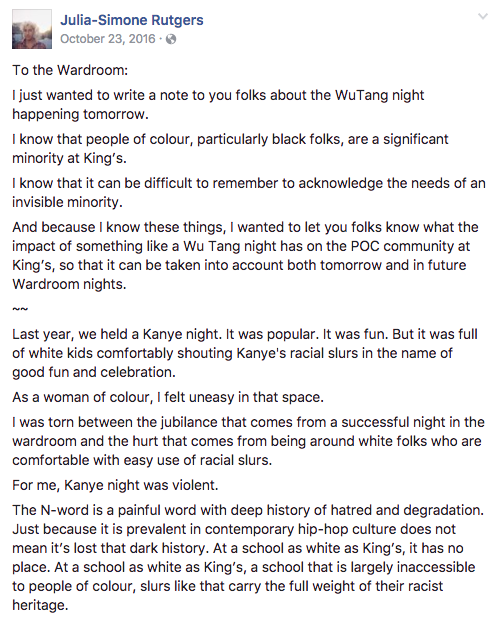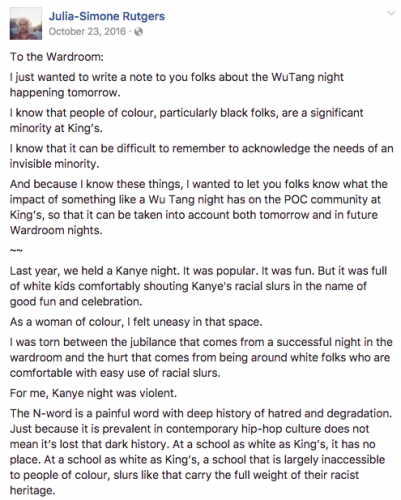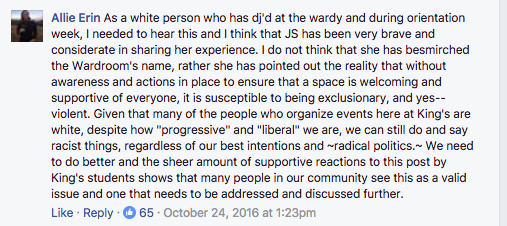Arts
Appropriation or appreciation?
Speakers at King's tackled racism, after plans for a "Wu-Tang night" sparked controversy

caption
Part of the original post from Julia-Simone Rutger“Just because you listen to Kanye doesn’t mean you know what it’s like to be a black man.”
The words of El Jones resonated with the crowd during last night’s panel discussion on race and music.

caption
Part of the original post from Julia-Simone RutgerThe panel drew an audience of students and community members alike, and addressed the intersectionality of music and race. It was part of a King’s Student Union response after controversy over a Facebook post for a “Wu-Tang Night,” at the Wardroom, which had been planned for Oct. 24, 2016.
In an interview with The Coast and in a Facebook post on the event page, King’s student Julia-Simone Rutger said that she felt dismay at a Kanye night in 2015, when she witnessed white students singing along with racial slurs in the music being played.
“To fill the room with these words further isolates the already isolated POC community,” she said in the post. “It drowns us in white privilege.”
Her post sparked an explosion on the Wardroom’s Facebook page as people expressed outrage at Rutger’s comments.

caption
A rebuttal to Rutger’s post
caption
A rebuttal to Rutger’s post
caption
A reaction to the event cancellation
caption
A reaction to the event cancellationKing’s isn’t the only place where people are asking questions about cultural appropriation and racism.
Two years ago in an article for TIME, Kareem Abdul-Jabbar, former NBA star, said that the dominant white American demographic stealing cultural identity from African-Americans is like “wearing the teeth of your pillaged enemy as a necklace.”
Jones was joined on the panel by philosophy professor Chike Jeffers and multidisciplinary artist Cory Bowles.
Jeffers, who teaches at Dalhousie University, said that he is critical of the term “cultural appropriation,” because it is “not helpful or useful – it brings to mind the idea of property rights.” He theorized that culture is a multifaceted and fluid concept and cannot just belong to one group.
Jones said that white people often “desire the products of blackness, but not the reality of blackness.” She added an example of how “cornrows on Kylie Jenner are considered fashionable,” but the same hairstyle on a black woman denotes a negative stereotype of poor black people.
Her sentiments were echoed by Bowles.
“For me, it’s about respect or disrespect,” he said. “Listen and be aware – whatever choices you make are going to have consequences.”

caption
Some students expressed positive feedback from Rutger’s post.Jones, who used to teach the Foundation Year Program at King’s, described the irony of playing culturally black music “in a university where you don’t offer African philosophy courses, but you have a Kanye night.” She added that the music “only gives you a particular lens on black life.”
The panelists were also asked on their opinions on what King’s could do to become a more inclusive space in the coming years. As Jones pointed out to the predominantly white audience, “No one is asking for (white) guilt; it’s a useless emotion.”
Jeffers told young people of colour to stop giving out “passes” to white people who engage in potentially harmful behaviour, like saying racist slurs.

caption
Rutger’s post also inspired solidarity from the community.Bowles took a more creative approach, counselling the spectators to be “curious” about one another and be open to communication and learning. Black people often feel “compartmentalized,” said Bowles, like they are always expected to fit into a stereotype.
“If we dismiss the reason why these things affect people, that’s wrong,” he said.

